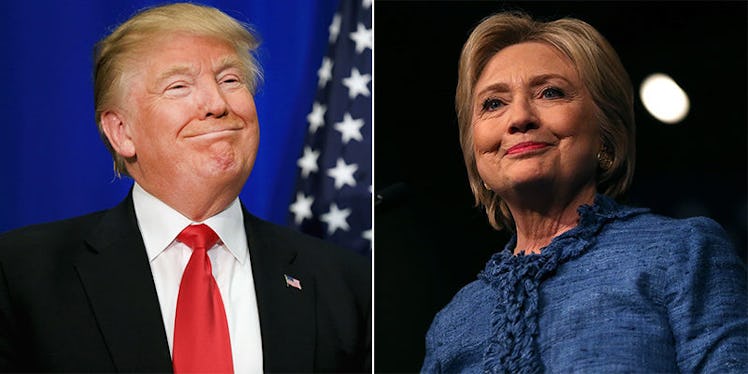
Here's Proof US Presidential Campaigns Are Way Too F*cking Long
There is no other country in the world that does presidential elections quite like the United States, and that's not necessarily a good thing.
To put this into perspective, Senator Ted Cruz became the first Republican candidate to officially announce he was running for president on March 23, 2015. This means it's been over a year since the first major candidate joined the 2016 presidential race, and the general election is still over 200 days away.
Comparatively, the campaign season surrounding Canada's recent election lasted 78 days. It was the longest election in Canadian history, but still incredibly short compared to US presidential elections.
Indeed, it's absurd how lengthy US presidential campaigns are and it's eroding the health and vitality of American democracy.
The nature of US presidential election gives first-term presidents about two years to focus on the job before they have to split time between governing and campaigning.
It's long past time for America to seriously think about changing the way it does elections. Among other necessary reforms (campaign finance, weekend voting, online voting, automatic registration, etc.), shortening the length of campaigns could be extremely beneficial.
Here are three reasons why the US needs to consider passing laws that limit the length of presidential campaigns.
1. Long campaigns exhaust voters and don't increase participation.
Some might say the longevity of US presidential campaigns provides voters with more time to acquaint themselves with the candidates. In other words, it helps ensure voters are both motivated to participate in the process and make informed decisions on election day.
This argument is not only insulting, there's also no evidence to support it.
Americans don't need two years to familiarize themselves with the candidates and issues surrounding the election. They are fully capable of gathering and comprehending the necessary information within a much shorter period of time.
Plenty of other countries have laws limiting the length of presidential campaigns, and they're doing just fine. In France, for example, the presidential campaign only lasts two weeks.
It's possible to have short presidential campaigns and not see the country descend into complete turmoil.

Moreover, the length of US presidential campaigns is clearly not getting Americans more interested in the political process.
Voter participation in the US is abysmal. In 2012, for example, only 53.6 percent of the adult voting population participated in the election.
Perhaps people would be more inclined to vote if the process didn't drag on forever (and maybe we'd have presidential debates where candidates discuss actual issues, instead of the size of their hands).
2. Long campaigns are far too expensive and maintain money's influence over US politics.
Due to the fact that the US has no laws dictating the length of president campaigns, the US presidential election has evolved into a nearly two-year spectacle -- and a very costly one. As Danielle Kurtzleben of NPR put it,
A candidate can't keep advertising for a year and a half... without millions of dollars at his or her disposal. The US system essentially requires candidates to raise millions of dollars to even mount a serious run.
Correspondingly, a total of around $7 billion was spent on the 2012 election by candidates, parties and outside groups. That's an exorbitant amount of money.
The issue of campaign finance reform has been very prominent throughout this election -- it's been the benchmark of Bernie Sander's "political revolution."
If American election campaigns were shorter, they'd also be cheaper (less time to raise and spend campaign money) and US politics would be less beholden to money.
3. Long campaigns increase divisiveness and damage America's global standing.
Republican presidential candidate Donald Trump is a prime example of how the length of US presidential campaigns can increase divisiveness among the populace and hurt America's standing in the world.
With no limits on the length of his campaign, Trump has been given a platform to do what he does best: build his brand.
Trump is a demagogue who's propelled himself forward by appealing to people's fears. But the more attention he's received, the better his campaign has done. He's taken complete advantage of the ridiculous nature of American elections. Some thought the length of the campaign would mean his popularity would only dwindle, but the complete opposite occurred.
What's resulted is an escalation of the divisiveness already plaguing this country.
Trump rallies have led to violence between his supporters and protestors on multiple occasions (and he's condoned this aggression more than once).
Meanwhile, countries around the world are looking on in horror as a bigoted, narcissistic xenophobe ascends to the Republican nomination for president.
Simply put, Trump has already succeeded in eroding America's international credibility, and the primary season isn't even over. He's revealed to the world how hateful and ignorant certain segments of the US can be -- and he still has plenty of time to continue this trend.
Regardless of whether or not he's elected, the damage is already done. America is the most divided it's been in generations, and the whole world knows it. In many ways, we only have ourselves to blame.
One of the lessons we should take from this campaign season is this: Doing things bigger is not necessarily better, particularly when it comes to politics and the future of the country.